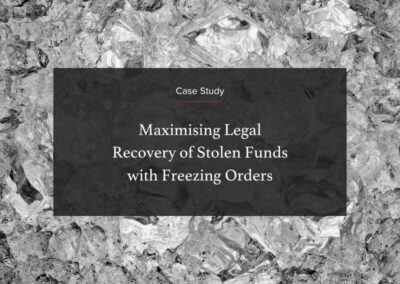What should I, the client, know when preparing for a hearing?

The first step in preparation is a genuine understanding of what the hearing is about. Each hearing has different objectives and requirements as well as challenges. It is vital to
Protecting Minority Shareholder Rights: A $2 Million Victory

When majority shareholders abuse their power, minority shareholders can feel powerless, but the law is on their side. Our recent case shows the difference a strategic approach can make, achieving justice and financial relief for a minority shareholder in a technology company—ultimately boosting their financial position by approximately $2 million.
The Challenge: Power Abused, Rights Denied
Our client, a director and one-third owner in the company, was sidelined and unfairly targeted. Their fellow shareholders, in a bid to secure more control and profits for themselves, terminated their employment, removed them from the board, and substantially increased their own remuneration. They
Understanding Oppressive Conduct In Shareholding: Safeguarding Minority Shareholder Rights

Debunking the myths: Minority Shareholder Rights
Australia’s corporate law has traditionally emphasised majority rule, often leaving minority shareholders with little influence or control over the operations of a company. In the case of a falling out, this can make minority shareholders feel trapped, forced to accept whatever they are offered on exit. This perception is incorrect. This article explores the challenges faced by minority shareholders within the framework of Australian law, provides insights into the rights available to minority shareholders and the avenues open for recourse.
Risks Impacting Minority Shareholders
Minority shareholders often face a variety of risks that can
Counterclaim Defeated, Recapture of $1.3 Million Debt

In a recent legal battle at the County Court of Victoria, an international vehicle parts manufacturer faced a significant challenge: recovering a substantial debt of $1.3 m from an Australian distribution partner. However, what seemed like a straightforward debt recovery case took a contentious turn when the defendants filed a $1.3 m counterclaim.
The distributor counterclaimed, contending our client breached an alleged exclusive distribution agreement and/or engaged in misleading conduct and as such, sought damages under the Australian Consumer Law.
These allegations posed a serious threat not only to our client’s financial interests but also to their reputation in the
Negotiated settlement results in release from potential $4m liability, plus payment from claimant

A potential $4 million liability looming on the horizon would be nothing short of stressful for any business. After all, the likelihood of bankruptcy or significant layoffs to pay such a claim could mean the end of the business.
Our client, an international hotel manager, faced a commercial dispute with an owner of a hotel that our client managed.
The owner accused our client of breaching duties and implied contractual terms, leading to alleged losses of nearly $4 million, including damage and loss of revenue.
Our client counterclaimed for $300,000 in unpaid fees.
We successfully negotiated a settlement, resulting in
Maximising Recovery of Stolen Funds by Obtaining Freezing Orders

When running a business, trust is paramount.
Unfortunately, our clients found out the hard way that a director in their company had been misusing company funds to the tune of $2.5 million for his own personal gain and to benefit his private entities.
Time is of the Essence
When dealing with cases of financial misconduct, time is of the essence. We swiftly obtained freezing orders against the director personally and his shareholding entity which traded with his other businesses. This was essential in preventing assets from being dissipated, leaving our clients (as creditors) with little to recover.
Once we had
Successful Defence to Unfair Contract Terms Case

Tailored and well-structured standard form contracts are the bedrock of robust commercial relationships, for both business and consumer relationships. They provide clarity for all parties and ensure businesses are compliant with their legal obligations.
By proactively outlining and communicating equitable terms by way of a standard form contract, businesses not only mitigate the risk of customer actions in respect of the contract for uncertainty or unfair terms, but also cultivate trust, credibility, and enduring relationships with clients.
However, even the most robust contract will not prevent claims of unfair contract terms.
This was demonstrated in a case where we represented
Third Party Payments – Are They an Unfair Preference?

The recent Victorian Court of Appeal judgment in Cant v Mad Brothers Earthmoving Pty Ltd [2020] VSCA 198 clarifies the circumstances in which a payment from a third party may constitute an unfair preference. The decision is important to any creditors with potential exposure to unfair preference claims and for insolvency practitioners seeking to pursue such claims.
Court Terminates Director Friendly DOCA on Application of Minority Creditor

The voluntary administration regime is intended to maximise the chance of a company continuing or to provide a better return to creditors than an immediate winding up of the company. The regime offers great flexibility. This leaves it open to abuse by directors and related entities seeking to avoid legitimate debts, scrutiny of their conduct or to obtain a direct benefit for themselves.
Ownership Dispute Over Abandoned Chattels

The Results Legal team was recently engaged to assist one of our banking clients seize and sell land subject to first registered mortgage security.
A shipping container filled with specialised mining and drilling equipment was located on the secured property.
After taking possession of the property, our client was contacted by a third party who claimed ownership of the mining and drilling equipment.
Minority Creditor Terminates Director Friendly Voluntary Administration

After pursuing a long and hard fought Supreme Court claim, our client obtained judgment for an amount of $1.64 million. Shortly thereafter, the defendant company was placed into voluntary administration by its director.
Following the first meeting of creditors, it became apparent that related parties had sufficient voting power in both number and value to successfully put up a deed of company arrangement.
Removal of Squatter from Property Seized from Deceased Estate

Secured recovery actions can often involve complex and contentious situations which require attention a focus on risk management.
This was evidenced in one particular matter where our client was the mortgagee of a deceased estate.
Mining Dispute Successfully Resolved

Our client, a large heavy equipment supplier, sold several used items of mining equipment for use at a mine site which required commissioning. A separate contract was also entered into between the parties for the ongoing maintenance of the equipment.
Asset Realisation in Complex Insolvency Estate

In 2014, Results Legal was instructed by the trustee in Bankruptcy of former horse racing and breeding magnate, Lee James Fleming, who had previously run a horse stud in southern Victoria that was home to Bel Esprit – the sire of undefeated mare Black Caviar.
$2.7 Million Recovered in Seven Days

Large financial exposure is not uncommon in the mining and resources sector.
Providing specialist representation for an equipment finance company, we were approached to recover a $2.7-million debt from operator of a Western Australian coal mine.
Peak Workloads Successfully Managed for Insurance Client

Having worked with a range of insurance companies, government agencies and large corporate partners, Results Legal has have developed systems and procedures to process large volumes of legal recovery work within a short space of time.
Trusted Adviser for Prestige Motor Dealer Group

Our team regularly acts on behalf of a large prestige motor dealer group in a broad range of dispute resolution matters.
We have enforced contracts of sale for luxury high end motor vehicles and opposed claims from customers pertaining to the delivery and standard of delivered vehicle.
Court terminates voluntary administration on application of minority creditor

The voluntary administration regime offers great flexibility. This leaves it open to abuse by directors and related entities seeking to avoid legitimate debts, scrutiny of their conduct or to obtain a direct benefit for themselves.
